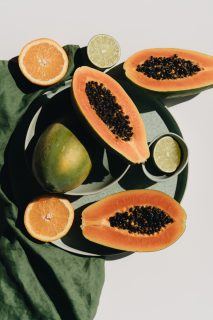We all know vitamin C for its ability to boost the immune system. The second we start to feel unwell, we tend to turn to the immune-boosting properties of vitamin C and haul out the orange juice and vitamin C supplements. However it isn’t just good for supporting the immune system, it turns out that vitamin C has some other tricks up its sleeve. It could even be helpful in boosting your mood and even keeping your skin glowing.
What is Vitamin C and how much do we need?

It’s the vitamin we think of most commonly when it comes to boosting the immune system. Vitamin C is brilliant at preventing, or at the very least shortening, the span of infections. However, the human body doesn’t naturally produce or store it. This means that you need to make sure to get enough on a daily basis.
Though it is proven to help with recovery times when it comes to colds and flues, it has not yet been proven to have any benefit when it comes to Covid 19 (SARS-CoV-2) or any of its strains.
It’s great for boosting your mood
It seems that it’s more than just a great immune booster. According to Uma Naidoo, MD, a Harvard-trained psychiatrist and professional chef, it can help to boost your mental health as well. The main reason that it’s so great for boosting your mood? Dr. Naidoo explains that “it’s essential for the production of neurotransmitters in the brain”. Dopamine is one of these neurotransmitters, perhaps the best known. Dopamine is often referred to as the ‘happy’ chemical and is vital for your mental health. It’s the chemical that makes you feel both energized and happy and is an essential part of the brain’s pleasure and reward systems.

Photo by Viktoria Slowikowska from Pexels
Dr. Naidoo explained to Well + Good that when we don’t get enough vitamin C, it can cause dopamine levels to drop quite substantially. Another major part that it plays in helping the body convert dopamine into another important neurotransmitter called norepinephrine.
Whilst this may sound confusing, low norepinephrine levels can lead to depression and anxiety. Dr. Naidoo explains that “these neurotransmitters govern things like mood and cognition as well as protecting the brain from inflammation”. This might not seem to be linked, but many mental health conditions are connected to underlying inflammation.
Many psychiatrists are focusing on diet as well as medication
Of course, there are many factors at play when it comes to mental health, and simply increasing your levels of vitamin C isn’t going to automatically make you happier. It’s just one factor, and before you go ahead and grab any supplements, you need to find out whether you’re vitamin C deficient.

Photo by alleksana from Pexels
If you are feeling depressed or anxious, your first port of call should be a psychiatrist or psychologist. You should also consult a doctor and explore having a clinical assessment in order to find out whether you are deficient in any nutrients.
If you do find that your vitamin C levels are low, Dr. Naidoo reassures you that it’s relatively easy to fix. In fact, mostly, you won’t even need to include supplements. Mostly, you’ll be able to get enough in your diet as long as you’re eating the right things.
Other than citrus fruits, Dr. Naidoo also says she often recommends eating red bell peppers, brussels sprouts, spinach, strawberries, papaya, and broccoli. According to Healthline, the recommended daily amount of vitamin C is 75 mg for women and 90 mg for men. In the case of supplements, don’t take more than 2000 mg daily.
References
https://www.healthline.com/health/food-nutrition/foods-that-boost-the-immune-system#poultry
https://www.wellandgood.com/study-healthy-food-treating-depression/



![women [longevity live]](https://longevitylive.com/wp-content/uploads/2020/01/photo-of-women-walking-down-the-street-1116984-100x100.jpg)










